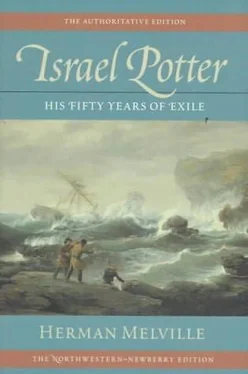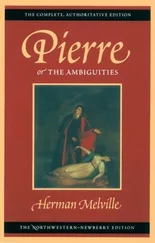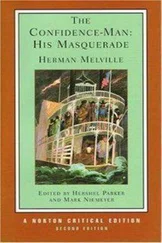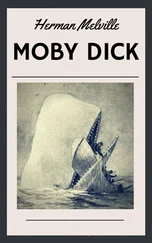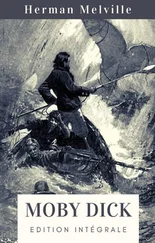Herman Melville - Israel Potter. Fifty Years of Exile
Здесь есть возможность читать онлайн «Herman Melville - Israel Potter. Fifty Years of Exile» весь текст электронной книги совершенно бесплатно (целиком полную версию без сокращений). В некоторых случаях можно слушать аудио, скачать через торрент в формате fb2 и присутствует краткое содержание. Жанр: Классическая проза, на английском языке. Описание произведения, (предисловие) а так же отзывы посетителей доступны на портале библиотеки ЛибКат.
- Название:Israel Potter. Fifty Years of Exile
- Автор:
- Жанр:
- Год:неизвестен
- ISBN:нет данных
- Рейтинг книги:4 / 5. Голосов: 1
-
Избранное:Добавить в избранное
- Отзывы:
-
Ваша оценка:
- 80
- 1
- 2
- 3
- 4
- 5
Israel Potter. Fifty Years of Exile: краткое содержание, описание и аннотация
Предлагаем к чтению аннотацию, описание, краткое содержание или предисловие (зависит от того, что написал сам автор книги «Israel Potter. Fifty Years of Exile»). Если вы не нашли необходимую информацию о книге — напишите в комментариях, мы постараемся отыскать её.
Israel Potter. Fifty Years of Exile — читать онлайн бесплатно полную книгу (весь текст) целиком
Ниже представлен текст книги, разбитый по страницам. Система сохранения места последней прочитанной страницы, позволяет с удобством читать онлайн бесплатно книгу «Israel Potter. Fifty Years of Exile», без необходимости каждый раз заново искать на чём Вы остановились. Поставьте закладку, и сможете в любой момент перейти на страницу, на которой закончили чтение.
Интервал:
Закладка:
Yet not a few of these petitioners had never been outside of the London smoke; a sort of crafty aristocracy in their way, who, without having endangered their own persons much if anything, reaped no insignificant share both of the glory and profit of the bloody battles they claimed; while some of the genuine working heroes, too brave to beg, too cut-up to work, and too poor to live, laid down quietly in corners and died.
And here it may be noted, as a fact nationally characteristic, that however desperately reduced at times, even to the sewers, Israel, the American, never sunk below the mud, to actual beggary.
Though henceforth elbowed out of many a chance threepenny job by the added thousands who contended with him against starvation, nevertheless, somehow he continued to subsist, as those tough old oaks of the cliffs, which, though hacked at by hail-stones of tempests, and even wantonly maimed by the passing woodman, still, however cramped by rival trees and fettered by rocks, succeed, against all odds, in keeping the vital nerve of the tap-root alive. And even towards the end, in his dismallest December, our veteran could still at intervals feel a momentary warmth in his topmost boughs. In his Moorfields' garret, over a handful of reignited cinders (which the night before might have warmed some lord), cinders raked up from the streets, he would drive away dolor, by talking with his one only surviving, and now motherless child-the spared Benjamin of his old age-of the far Canaan beyond the sea; rehearsing to the lad those well-remembered adventures among New England hills, and painting scenes of rustling happiness and plenty, in which the lowliest shared. And here, shadowy as it was, was the second alleviation hinted of above.
To these tales of the Fortunate Isles of the Free, recounted by one who had been there, the poor enslaved boy of Moorfields listened, night after night, as to the stories of Sinbad the Sailor. When would his father take him there? "Some day to come, my boy," would be the hopeful response of an unhoping heart. And "Would God it were to-morrow!" would be the impassioned reply.
In these talks Israel unconsciously sowed the seeds of his eventual return. For with added years, the boy felt added longing to escape his entailed misery, by compassing for his father and himself a voyage to the Promised Land. By his persevering efforts he succeeded at last, against every obstacle, in gaining credit in the right quarter to his extraordinary statements. In short, charitably stretching a technical point, the American Consul finally saw father and son embarked in the Thames for Boston.
It was the year 1826; half a century since Israel, in early manhood, had sailed a prisoner in the Tartar frigate from the same port to which he now was bound. An octogenarian as he recrossed the brine, he showed locks besnowed as its foam. White-haired old Ocean seemed as a brother.
CHAPTER XXVII
REQUIESCAT IN PACE
It happened that the ship, gaining her port, was moored to the dock on a Fourth of July; and half an hour after landing, hustled by the riotous crowd near Faneuil Hall, the old man narrowly escaped being run over by a patriotic triumphal car in the procession, flying a broidered banner, inscribed with gilt letters:
It was on Copps' Hill, within the city bounds, one of the enemy's positions during the fight, that our wanderer found his best repose that day. Sitting down here on a mound in the graveyard, he looked off across Charles River towards the battle-ground, whose incipient monument, at that period, was hard to see, as a struggling sprig of corn in a chilly spring. Upon those heights, fifty years before, his now feeble hands had wielded both ends of the musket. There too he had received that slit upon the chest, which afterwards, in the affair with the Serapis, being traversed by a cutlass wound, made him now the bescarred bearer of a cross.
For a long time he sat mute, gazing blankly about him. The sultry July day was waning. His son sought to cheer him a little ere rising to return to the lodging for the present assigned them by the ship-captain.
"Nay," replied the old man, "I shall get no fitter rest than here by the mounds."
But from this true "Potter's Field," the boy at length drew him away; and encouraged next morning by a voluntary purse made up among the reassembled passengers, father and son started by stage for the country of the Housatonie. But the exile's presence in these old mountain townships proved less a return than a resurrection. At first, none knew him, nor could recall having heard of him. Ere long it was found, that more than thirty years previous, the last known survivor of his family in that region, a bachelor, following the example of three-fourths of his neighbors, had sold out and removed to a distant country in the west; where exactly, none could say.
He sought to get a glimpse of his father's homestead. But it had been burnt down long ago. Accompanied by his son, dim-eyed and dim-hearted, he next went to find the site. But the roads had years before been changed. The old road was now browsed over by sheep; the new one ran straight through what had formerly been orchards. But new orchards, planted from other suckers, and in time grafted, throve on sunny slopes near by, where blackberries had once been picked by the bushel. At length he came to a field waving with buckwheat. It seemed one of those fields which himself had often reaped. But it turned out, upon inquiry, that but three summers since a walnut grove had stood there. Then he vaguely remembered that his father had sometimes talked of planting such a grove, to defend the neighboring fields against the cold north wind; yet where precisely that grove was to have been, his shattered mind could not recall. But it seemed not unlikely that during his long exile, the walnut grove had been planted and harvested, as well as the annual crops preceding and succeeding it, on the very same soil.
Ere long, on the mountain side, he passed into an ancient natural wood, which seemed some way familiar, and midway in it, paused to contemplate a strange, mouldy pile, resting at one end against a sturdy beech.
Though wherever touched by his staff, however lightly, this pile would crumble, yet here and there, even in powder, it preserved the exact look, each irregularly defined line, of what it had originally been-namely, a half-cord of stout hemlock (one of the woods least affected by exposure to the air), in a foregoing generation chopped and stacked up on the spot, against sledging-time, but, as sometimes happens in such cases, by subsequent oversight, abandoned to oblivious decay-type now, as it stood there, of forever arrested intentions, and a long life still rotting in early mishap.
"Do I dream?" mused the bewildered old man, "or what is this vision that comes to me of a cold, cloudy morning, long, long ago, and I heaving yon elbowed log against the beech, then a sapling? Nay, nay, I cannot be so old."
"Come away, father, from this dismal, damp wood," said his son, and led him forth.
Blindly ranging to and fro, they next saw a man ploughing. Advancing slowly, the wanderer met him by a little heap of ruinous burnt masonry, like a tumbled chimney, what seemed the jams of the fire-place, now aridly stuck over here and there, with thin, clinging, round, prohibitory mosses, like executors' wafers. Just as the oxen were bid stand, the stranger's plough was hitched over sideways, by sudden contact with some sunken stone at the ruin's base.
"There, this is the twentieth year my plough has struck this old hearthstone. Ah, old man, — sultry day, this."
"Whose house stood here, friend?" said the wanderer, touching the half-buried hearth with his staff, where a fresh furrow overlapped it.
Читать дальшеИнтервал:
Закладка:
Похожие книги на «Israel Potter. Fifty Years of Exile»
Представляем Вашему вниманию похожие книги на «Israel Potter. Fifty Years of Exile» списком для выбора. Мы отобрали схожую по названию и смыслу литературу в надежде предоставить читателям больше вариантов отыскать новые, интересные, ещё непрочитанные произведения.
Обсуждение, отзывы о книге «Israel Potter. Fifty Years of Exile» и просто собственные мнения читателей. Оставьте ваши комментарии, напишите, что Вы думаете о произведении, его смысле или главных героях. Укажите что конкретно понравилось, а что нет, и почему Вы так считаете.
